The God Squad up the road: Douglas Metcalf and the Full Gospel Mission
Bronwyn Rideout - 17th July 2023
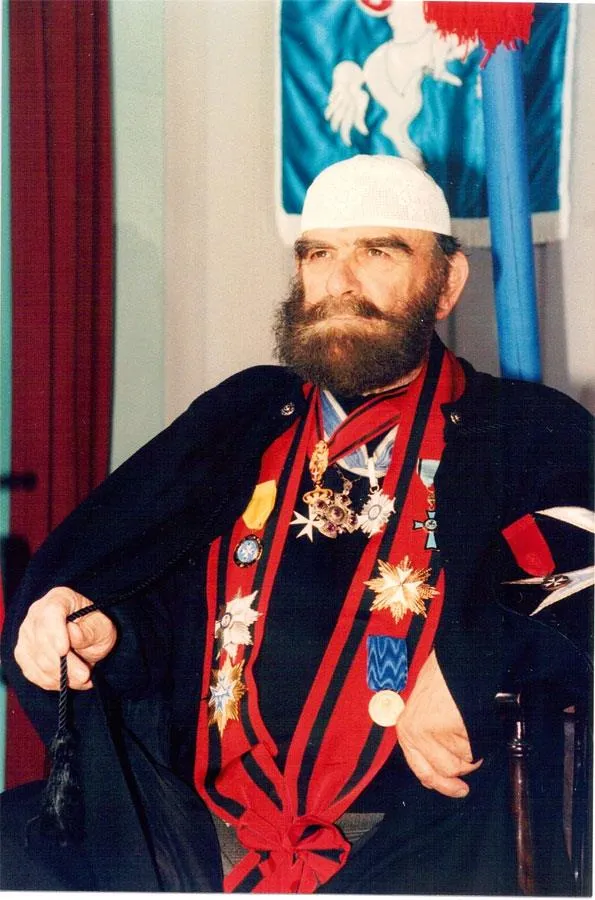
Source | Douglas Metcalf
The goings on of the late “Bishop” Douglas Metcalf and the Full Gospel Mission/God Squad/Camp David have been on my list to profile for awhile. When I’m able to steer the conversation to my special interest (MLMs, Cults, New Religious Movements etc.,) it is truly touch-and-go whether my unsuspecting audience has even heard of this group. It isn’t as if the shenanigans of The God Squad were ever under the radar or have fully faded from public consciousness; Christchurch newspaper The Press has always kept their finger on that pulse and publish updates on former members while ex-followers Serafina Tané and Rosina Claxton/Ngapaki Rose have made their stories available for Australasian news outlets in recent decades. Metcalf’s group also draws comparison to a far better known Branch Davidian’s and, albeit less frequently, is a topic for American podcasts.
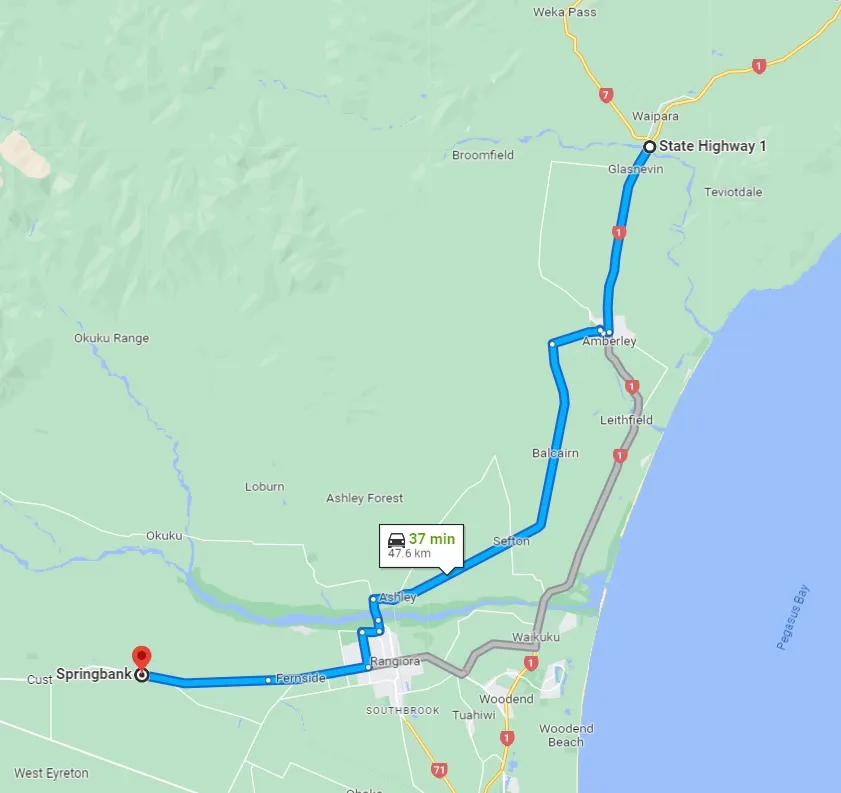
The route from Springbank (Neville Cooper) to Camp David (Douglas Metcalf)
However, it was the recent court success of the Gloriavale Six that serves as the true impetus of this article. Waipara-based Metcalf was approximately 40 minutes up the road from the Springbank Christian Community, the precursor to Gloriavale with both groups operating around the same time. The Cooperites landed their church in the Cust region in 1969 and weathered Neville Cooper’s many scandals as they relocated to their current location of Gloriavale on the West Coast of the South Island between 1991-1995. Metcalf initially controlled his own following from Eureka Street in the Christchurch suburb of Aranui before building a compound along the banks of the Waipara River at Echo Valley Farm in 1972; while Camp David would initially survive the death of Metcalf in 1989, by 1996 revelations that Metcalf had sexually abused many of his female followers, including children, caused the camp to fracture before it finally shuttered with the sale of the property in 2002. Despite the similarities and literal close proximity of Springbank Christian Community and Camp David, I don’t often hear or see of an explicit connection between these groups, be it a social one or one based on trade.
Who was Douglas Alexander Metcalf
Much of what I was able to glean about the life of Douglas Metcalf comes from the 2015 memoir written by John Turton, a former low-level member of the group who was excommunicated in 1984, a report written by Romilly Fraser of the Family Unity and Freedom to Worship Group in 1978, and Rosina Claxton/Ngapaki Rose’s memoir Counterfeit Coin. Of the three works Fraser, a former Scientologist, was the most positive as his publication was intended to be an investigation of allegations of religious harassment and discrimination. Unfortunately, while he gets most of the facts about the timeline of the 1977 raids right, he sorely has the wool pulled over his eyes about Metcalf’s so-called daughter.
Earliest records of the Full Gospel Mission go back as far as 1926 after a visit by a Yorkshire evangelist named Smith Wigglesworth. However, its best known ‘iteration’ began in 1957 when Douglas Alexander Metcalf claimed the title of Pastor. Metcalf himself was born in Dunedin in 1921 and was one of three children born to a Scottish mother and an English/Irish father. While Metcalf’s relationship with his mother as a child was positive, his father was described as having a violent and explosive temper. As per Turton (who refers to Metcalf as Joshua throughout his book), Metcalf came from an old-school pentecostal background and had followed a preacher named William E. Wilson of the Evangelist Church of Christ in Christchurch. Publications by the Mission also included other evangelists such as William Branham and Charles G. Finney Metcalf had a wide range of occupations including primary teaching, machining, and labouring while his interests included UFOs, religion, heraldry, medals, and firearms both antique and modern; these diverse interests were incorporated into the pageantry, branding, and day-to-day life of compound members.
Claxton states that Metcalf joined the NZ Army during the Second World War with the medical corps and his unit was based in various areas of Egypt. He spent much of his free time with the Muslim staff with whom he practised Arabic, ate, and socialised with; he also claimed to have travelled to Mecca with this group as well. Metcalf would also have visions and claim that he was given the name Joshua by a heavenly visitor. Upon his return to NZ, he trained as a teacher but in the aftermath of his death, it was alleged that he was dismissed for interfering with one of his students.
How Metcalf got into preaching and ministering is not recorded and it is claimed by Turton that Metcalf had fallen out with many church leaders in Christchurch due to presenting himself as Elijah and pointing out where churches had got it wrong. Nevertheless, Metcalf’s charisma helped him succeed in collecting followers by going door-to-door. The New Zealand government was in the process of building homes for low-income families, and those on the waitlist were housed in a transit camp situated near Christchurch Airport. Rosina Claxton/Ngapaki Rose’s mother Golda was home when Metcalf knocked on her door in 1957 to share a message of salvation. Golda challenged Metcalf to heal a friend who was dying of leukaemia. Metcalf left after a brief prayer and somehow soon after, said friend recovered from her illness quickly; leaving Doctors without a scientific explanation for her illness. Claxton’s mother was hooked and soon afterwards the entire family was in his thrall. Golda became friends with Metcalf’s wife Pearl and the two women would host bible study together, providing Metcalf the opportunity to proselytize to a more welcoming audience.
Throughout the 1960s, the two families would meet at the Metcalf home in Aranui and their home church would grow to include hundreds of people. Between 1961 to 1966, numbers grew from 308 to 1060; in 1977, it was estimated that the group had 1500 converts while a different 1977 article suggested a more conservative membership of 800. Metcalf would also purchase the neighbouring property on 104 Eureka Street in 1975 and build a second dwelling that included a dormitory on the second floor. To accommodate a growing congregation and his own ego, Metcalf acquired the infamous Camp David property off Darnley Road in Waipara in 1972.
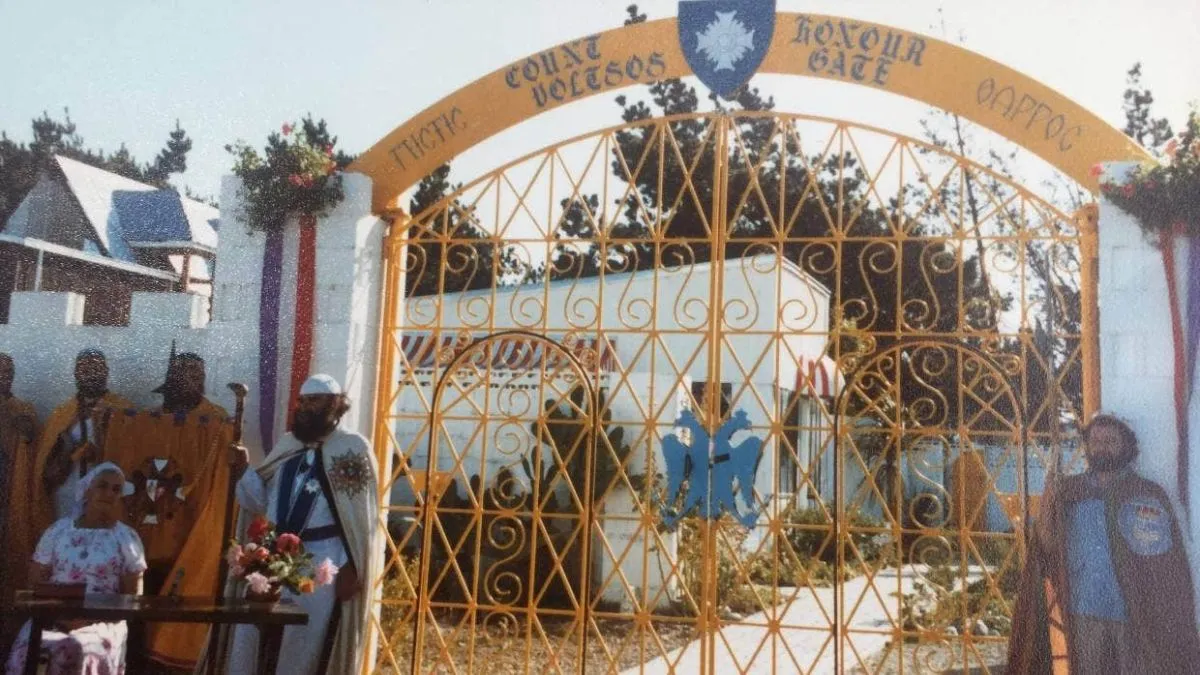
Source | Internal gates at Camp David
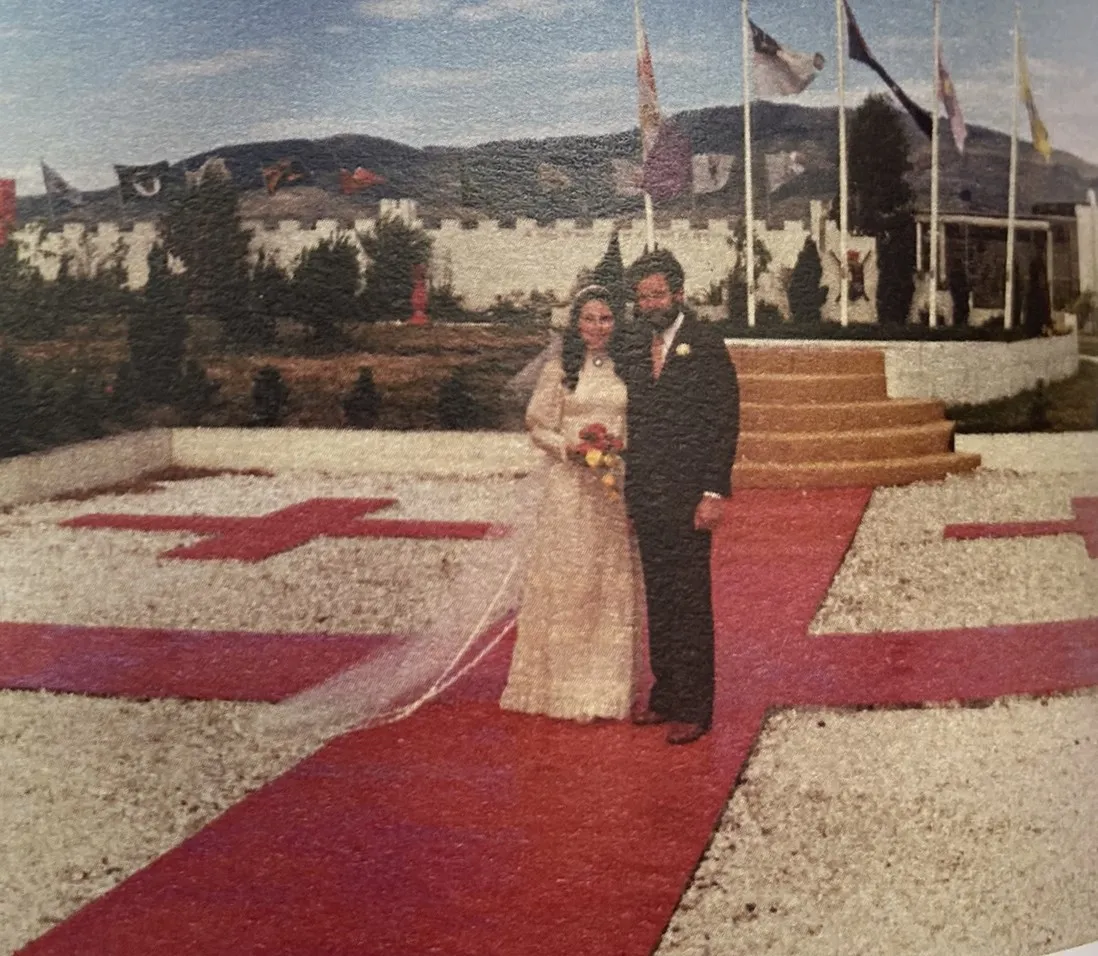
From John Turton’s Muddy Waters | Inside Camp David
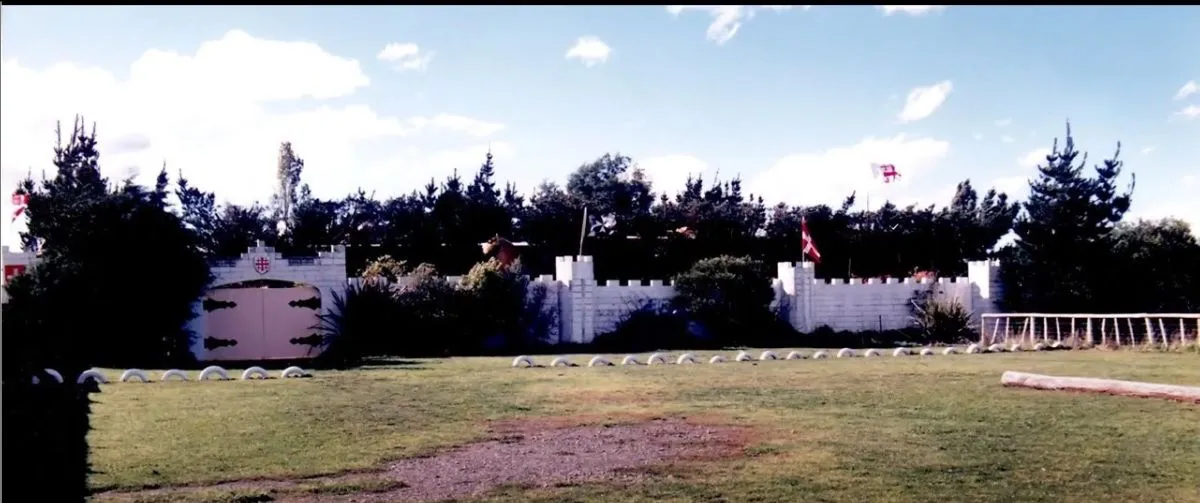
At one point, followers referred to Douglas Metcalf as Dr. Metcalf. In the 1974 Gazette that listed registered marriage celebrants, Metcalf claimed a PhD and a D. Litt. (in Middle Eastern Literature) conferred by the Sussex College of Technology. The college was not recognised by the British Government, the US, or elsewhere in the Commonwealth. While Metcalf claimed that he attended and completed exams in a physical building, it was actually a diploma mill which sold certificates at a cost of 15 pounds. When pressed on the subject, Metcalf argued no one expected a Salvation Army brigadier to have actually risen through the armed forces. Claxton also recalled that Metcalf studied Naturopathy and Homeopathy via correspondence with a Dr. Brown in England; this was a doctorate in naturopathy from the Anglo-American Institute of Drugless Therapy. Despite the absence of real qualifications or respect for them, that didn’t stop Metcalf from trying to profit or gain advantage from them. During the 1977 raid, Metcalf blamed his absence on his attendance at a “university and government-level” conference on drug abuse.
Metcalf was also not above other sketchy behaviours. The sect has a fleet of vehicles labeled with St John Volunteer Corps and the Maltese cross. This fleet would help stranded motorists. While the St John Ambulance service was right to be concerned, Metcalf’s knowledge of heraldry meant that he had an out. Through the American branch of the Hospitaller Order of St John of Jerusalem, the sect was granted a royal charter by the late King Peter II of Yugoslavia in 1967. St John Ambulance’s charter came from a different but similar sounding order, The Most Venerable Order of the Hospital of Saint John of Jerusalem.
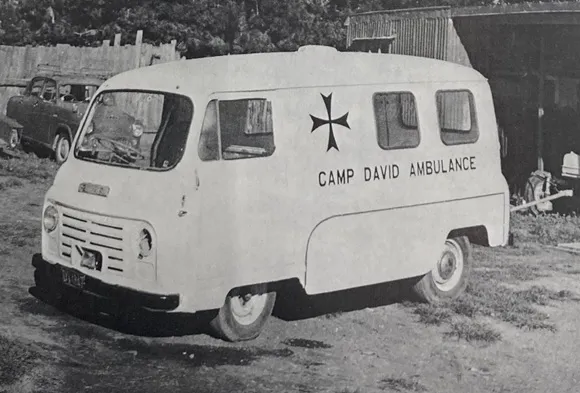
From John Turton’s Muddy Waters | Camp David Ambulance
What were the beliefs and teachings of The Full Gospel Mission?
Members of the sect stated that the group regarded themselves as one of the Lost Tribes of Israel, a pseudohistorical belief also known as British Israelism. Although there are similarities to the Twelve Tribes Communities, they are distinct organisations.
Despite Metcalf’s earlier door knocking, Fraser’s takeaway was that fewer members who were loyal and faithful were preferred to having a large, casual membership. They were described as sporadic publishers.
Women were expected to be subservient and dress modestly with head covering and long dresses.
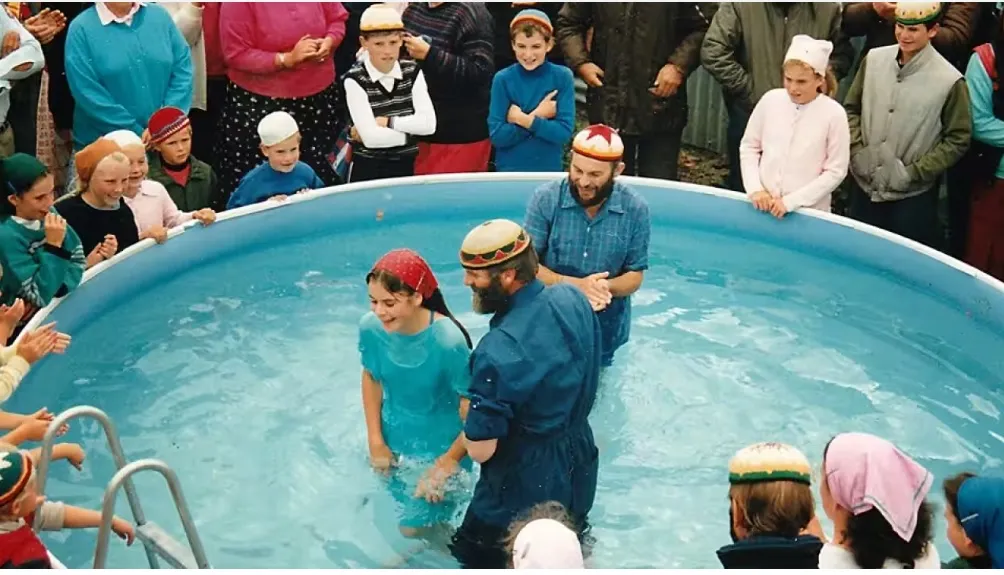
Source| Serafina Tané being baptised
It was estimated that millions in tithings were used to fund Metcalf’s frequent trips to Europe and Jerusalem. However, only followers who could afford their own ticket or were invited by Metcalf were allowed to join him.
In the 1970s, Metcalf instilled in his followers a fear that they would be persecuted, hunted, and killed for being Christian. An emergency retreat in case they needed to flee was prepared in a gully near Murchison. Even the sympathetic Romilly Fraser noted that members believed the tribulation was at hand, though speculated that the group’s pre-existing inclination for self-sufficiency would help it survive a possible World War 3.
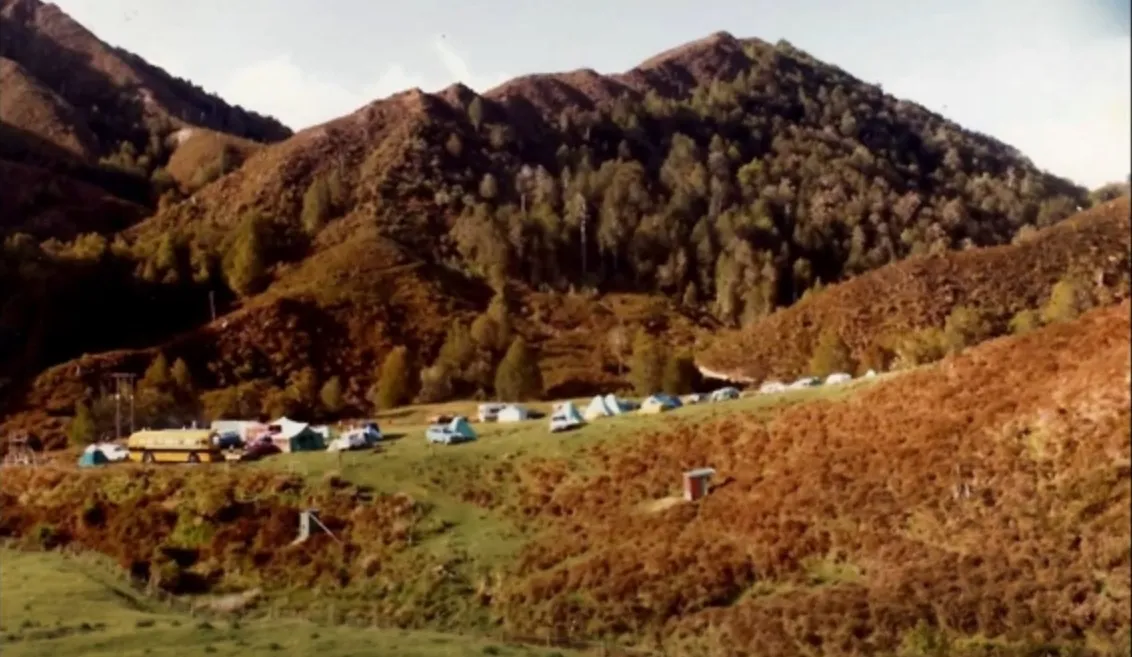
While the practices of the Full Gospel Mission were ostensibly Old Testament-inspired Christianity, Metcalf had a tendency to mix and match anything from Middle Eastern symbolism to Jewish-ish and medieval design. Instead of Christmas, the group would celebrate the Feast of the Tabernacle in October, the month of Metcalf’s birth.
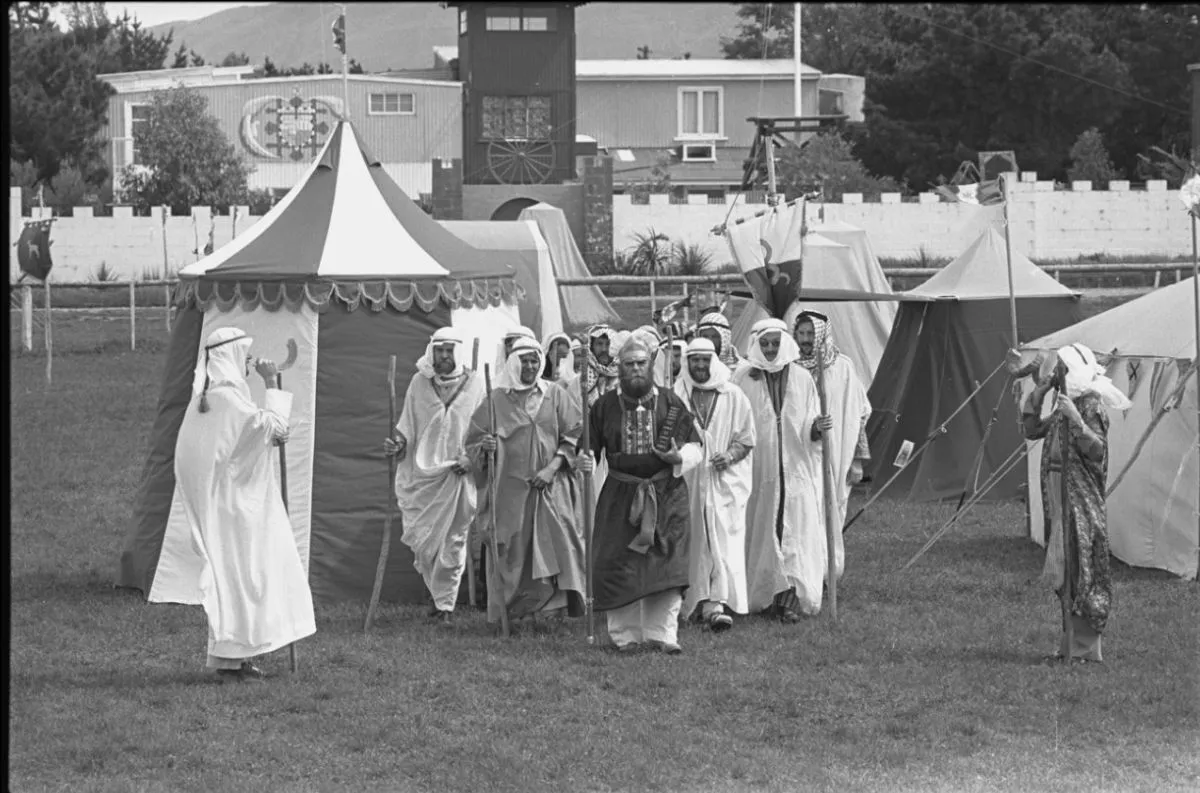
Source | David Metcalfe and followers celebrating Feast of the Tabernacle
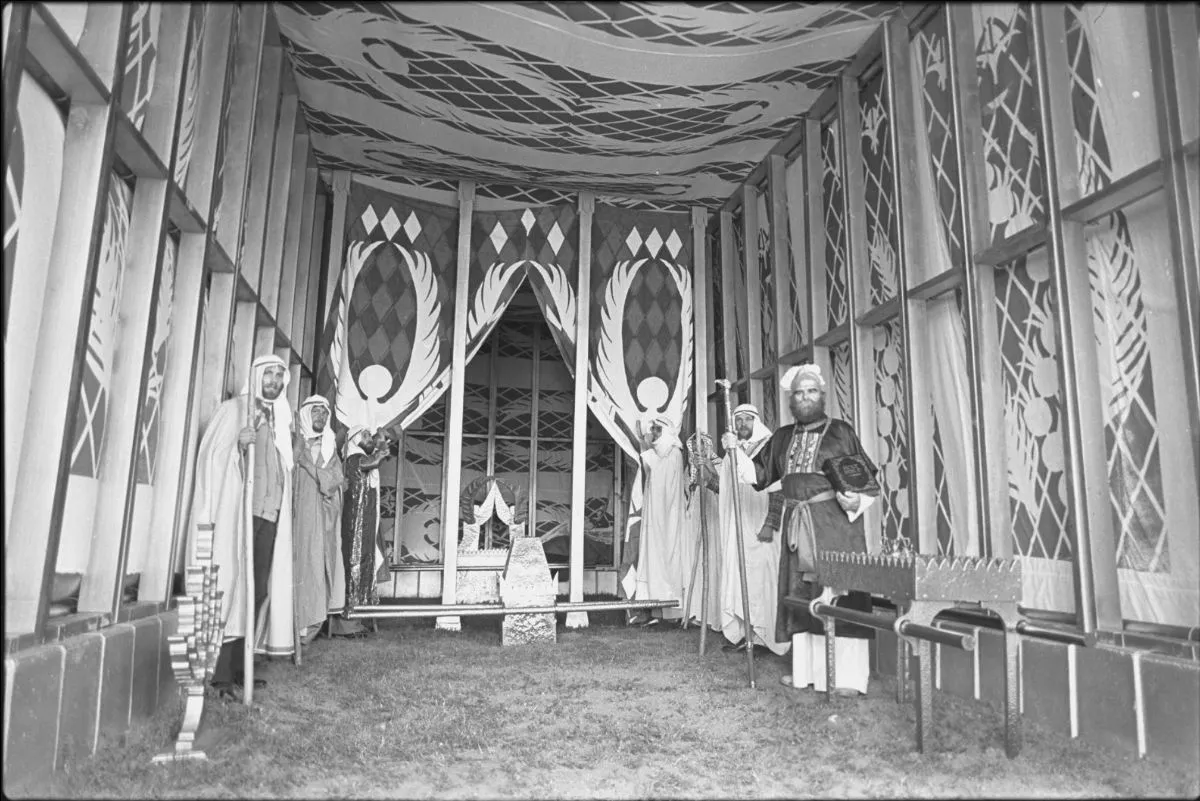
Source | Inside the Tabernacle of David, 1981
Sometimes, Metcalf’s beliefs trended into the realm of secular conspiracy theory. For example, barcodes were the mark of the beast and once it became impossible to buy food without barcodes, adherents would go and live off the land. In his personal time, Metcalf was known to engage in new age practices such as astral projection which he would denounce as demonic to his followers.
How members of Camp David viewed Metcalf changed over the course of his reign. In the beginning, he was a charismatic pastor who had a vision. Then, he was seen as a prophet with gifts of healing (as demonstrated with Golda’s friend) and then as Jesus Christ himself, earning the name Lord Yahshuah Messiah.
How did Metcalf recruit?
While many were recruited through bible groups such as those hosted by Golda and Pearl, John Turton, like Serafina Tané’s father and many other members, were recruited from the Royal New Zealand Air Force. Turton came from a fairly religious family of his own and entering the RNZAF in 1969 was a culture shock. Like many sheltered youths, Turton struggled with his newly-found freedom and his perceived lack of direction. Eventually, he connected with fellow airmen and officers who took part in a revival at Wigram airforce base. Taking part in the revival were two brothers, Darren and Brandon, who were part of Metcalf’s group.Turton recalls Darren in particular manipulating things at Wigram in order to make contact with other new christians on base. Turton alleged that the base Chaplain at the time was also a part of Metcalf’s group. Senior leadership at Wigram caught wind of this and attempted to put an end to it by assigning Darren and those associated with him to other bases, but that only facilitated the spread further as Turton was stationed at Whenuapai base in Auckland. Another follower, Stacey Squires, was introduced while stationed at Ohakea.
Why did people stay?
Turton argues that no one was brainwashed but willingly did what was asked of them by Metcalf because they were seeking love, and belonging in a world and society undergoing massive upheaval in the 1960s and 1970s. Part of this love included building and decorating the entire compound. Some families were given accommodation, oftentimes caravans and converted buses, that may not have been otherwise available to them.
On the other 1and, Metcalf was able to keep a lot of his female members under control through manipulation, shame, and threats of hell and eternal damnation if they left. Metcalf is accused of raping and sexually abusing many of his female followers including Rosina Claxton and her mother Golda and in many women (like Rosina), Metcalf’s predation began when they were still prepubescents. In her memoir, Rosina recounts several incidents where she accompanied Metcalf overseas without her parents and was sexually exploited by him.
What happened in 1977?
On May 27th, 1977 Camp David was raided by six detectives and 5 RNZAF personnel. There was concern that current or former RNZAF personnel had purloined air force equipment for the sect’s benefit. During this raid, only aeroplane batteries and small electronics were seized and were later determined to be either similar to what the RNZAF used (The electronics) or, in the case of the battery, plans were being made to dispose of it properly.
On June 1st, 1977 the camp was raided again, but this time only the police were present on the grounds of a subversive conspiracy. 170 firearms, many being antiques, were seized along with sizable amounts of ammunition and gunpowder. Metcalf was initially interviewed and then left the country to attend conferences with his daughter “Rosiena” according to Fraser.
Sadly, Fraser had the wool pulled over their eyes here at least. Rosiena was not Metcalf’s daughter per se. This was the 20 year-old Rosina Claxton, a woman he had sexually abused since she was a preteen and the daughter of longtime devoted followers. Metcalf did ‘adopt’ her into his family and move her into his home, but that did little to change the manner of his attention towards her. The two fled the country not to attend a “university and government-led conference on drug abuse” as he claimed to reporters, but rather to lay low until it was safe to return.
On June 2nd, 1977 a property in Woburn that was associated with Metcalf was raided with 37 firearms and more ammunition was seized.
On June 3rd, two mission members and RNZAF personnel were arrested and a search of their van uncovered more gun powder, shells, and three shotguns. The men were arrested for possession despite having all permits and registrations in order. Similar but less successful searches occurred in properties across New Zealand for the next several days. An expose about the raids published by the New Zealand Truth is believed to be the first instance in which the Full Gospel Mission is described as the God Squad, a name that has stuck with the sect ever since.
While multiple charges were laid and several members appeared before the courts, all major charges were dismissed while minor charges pertaining to the storage regulations of the powder and ammunition were proved. Only $300 in fines were levied but several of the RNZAF personnel left the Air Force. Metcalf was also appeared before the court on November 21st, 1977 to face charges of unlawful possession of:
- 20 rifles
- 22 shotguns
- 4 gas-operated air pistols
- 1 air pistol
- 42 pounds of reloading powder
- 56,650 rounds of ammunition
On November 29th, Metcalf was also discharged without conviction and an order was made for the firearms to be returned to their rightful owners.
The group made several attempts afterwards to reverse the negative publicity such as hosting an open day and participating in a local gala.
By and large, that appears to have worked as current archival records indicate that the 80s remained a fairly quiet time, newswise, for the sect save for 1982 and 1987. In 1982, a dispute between the sect and the Hurunui County Council over building permits led the sect to accuse the council of interfering with their right to practice their religion and declare themselves an independent state called the Palatinate of Canan. 1987 when another raid was attempted and went nowhere.
How did it all fall apart?
Metcalf had long experienced poor health and died of a heart attack in 1989. Followers prayed and watched over the body for at least 24 hours awaiting his resurrection before reality set in.
The sect did not fall apart immediately but it did falter under the far less charismatic leadership of Metcalf’s son-in-law. Darryl Metcalf Williams. Women like Rosina who were trapped by their illusory ties to Metcalf were free to move on with their lives and move out of the commune.
The 1993 siege of the Branch Davidian compound in Waco reawakened paranoia in the group, many of whom still remembered the 1977 raids. Williams demanded followers vow to follow him to the end and Tané recalls the group started to stockpile weapons again.
While increased outside interactions increased their questioning of the beliefs they grew up with, it was the 1996 revelations of the true depth and breadth of Metcalf sexual improprieties that all but brought an end to the Full Gospel Mission and Camp David. For many in the wider fellowship, the breakdown of the group required them to reassess everything Metcalf had told them to see if it measured up to what other churches taught.
The property was soon abandoned but rumours about buried caches of guns persist. The existence of sensitive materials (rooms, tapes, written materials) was another matter entirely but it is reported that such material was destroyed in 2002. A trust, which had been set up in the 1980s, continued overseeing the farmlet and the handful of individuals who still lived there.
How closely will you be watching the Gloriavale Six judgment?
Robyn Bristow would report on the dissolution of Camp David over the next several years for The Press. The sect owned a decent amount of land; Camp David was about 37 ha and the bolthole in Murchinson was 180 ha. In 2002, 68 former members demanded that the six trustees of the Full Gospel Mission Fellowship sell the sect’s assets and donate the proceeds to charity. They argued that they had poured millions of their own assets into the organisation and walked away with nothing. Not all former members agreed, some wanted to start a new fellowship at the old site while others were content with the status quo as they had remained on the property and still operated businesses there. In 2006, mediation over the sale of Camp David went ahead and in 2007, it was revealed that the property was split three-ways: $500,000 was set aside for charitable purposes; those still living on the property or had businesses operating on the property received land, and those on the outside will get cash for the property that is sold. With the Waipara land being in the middle of prime winegrowing real estate, it was estimated that 37 ha property could sell for $800,000 to $2 million but other estimates suggested a single hectare could demand $60,000 to $85,000. In 2015, some members still lived on the site, with a business still operating out of a workshop run by the then camp owner. Images captured by an Urbex team in 2014 showed parts of the property is significant disrepair.
What will be interesting to see in the coming months or years is what deliberations are made in favour of Gloriavale’s denizens. Gloriavale’s Overseeing Shepherd Howard Temple warned that the ruling had wide-ranging implications beyond Gloriavale and into other faith-based communities. While I am not suggesting that Temple and other Gloriavale elders are going to toss their toys and disband the community entirely to avoid responsibility, anyone who has followed the Centrepoint saga or is aware of the wind down of Camp David may feel that uncomfortable sense of deja vu.
While we can wonder “Will the community itself choose to disband? How do you quantify losing your youth and decades of lost assets?”, is it time for an edgier conversation. New Zealand is averaging nearly one major homegrown sect breakdown per decade which leaves hundreds of people impoverished and almost as many suffering from sexual, physical, and religious abuse and trauma. Maybe more if you want to include Arise and other mega church blowouts.
I mean, How did this happen again?